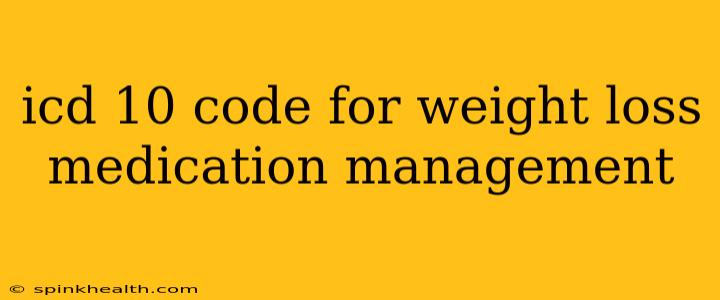Navigating the ICD-10 Code Maze for Weight Loss Medication Management
The journey to a healthier weight often involves a multifaceted approach, and for many, that includes medication management. Understanding the appropriate ICD-10 codes for this process is crucial for accurate billing and medical record-keeping. This isn't always straightforward, though, as the specific code depends heavily on the underlying reason for the weight loss intervention and the type of medication prescribed. Let's unravel this complexity together.
What is an ICD-10 Code?
Before diving into the specifics, it's helpful to understand the purpose of ICD-10 codes. The International Classification of Diseases, 10th Revision (ICD-10) is a system used by healthcare providers worldwide to classify and code diagnoses, symptoms, and procedures. These codes are essential for billing insurance companies, tracking disease prevalence, and conducting medical research.
There Isn't One Single ICD-10 Code for Weight Loss Medication Management
This is the crucial point. There isn't a single, universally applicable ICD-10 code for "weight loss medication management." The appropriate code depends on the diagnosis underlying the need for weight loss medication. This is why a thorough clinical evaluation is vital before assigning a code.
Common Underlying Diagnoses and Associated ICD-10 Codes
Here are some common conditions where weight loss medication might be prescribed, along with their associated ICD-10 codes. Remember that this is not an exhaustive list and a medical professional should always make the final determination of the appropriate code:
-
Obesity (E66): This is the most frequent reason for weight loss medication. The specific subcategory of E66 (e.g., E66.0 for uncomplicated obesity) will depend on the patient's BMI and associated health problems.
-
Binge Eating Disorder (F50.2): Weight loss medication might be used as an adjunct treatment for this eating disorder, often in conjunction with therapy.
-
Hypothyroidism (E03): Weight gain is a common symptom of hypothyroidism, and medication to address the underlying hormonal imbalance is the primary focus, not necessarily the weight itself. The code would be specific to the type of hypothyroidism.
-
Polycystic Ovary Syndrome (PCOS) (E28.2): Weight management is often part of the treatment plan for PCOS, but the primary diagnosis and therefore the code remains E28.2.
-
Type 2 Diabetes (E11): Weight loss can be a beneficial part of managing type 2 diabetes, but the primary diagnosis and code is related to the diabetes itself.
-
Sleep Apnea (G47.3): Weight loss can improve sleep apnea symptoms, but the primary diagnostic code would reflect the sleep disorder, not weight management.
What about the Medication itself?
The type of medication prescribed does not directly determine the ICD-10 code. The code reflects the diagnosis, not the treatment. The medication administration is coded separately using procedural codes.
How are these codes used in billing?
The physician or healthcare provider uses the appropriate ICD-10 code to describe the patient's diagnosis on the claim submitted to the insurance company. This code helps determine medical necessity and coverage for the provided services, including medication management.
What if I'm unsure of the correct code?
Consult the official ICD-10-CM coding manual and/or seek advice from a certified medical coder or your billing department. Incorrect coding can lead to claim denials.
This information is for educational purposes only and does not constitute medical advice. Always consult with a qualified healthcare professional for accurate diagnosis and treatment. The correct ICD-10 code must always be determined by a medical professional based on a comprehensive patient evaluation.

